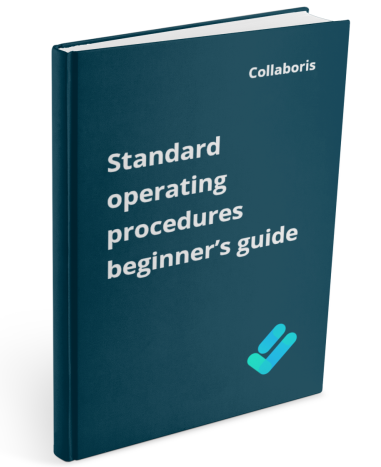Standard Operating Procedures - A complete guideStandard Operating Procedures (SOP) are key to many ...
What are Policies and why they are important

Policies, procedures, compliance and adherence are terms that are widely used throughout organizations worldwide. However, you could be forgiven for thinking they are the perfect oxymoron! How can a set of rules intended to maintain standards, be so widely and differently interpreted and implemented?
Although different organizations create policies for their specific circumstances, their purposes and policy goals remain aligned - to consistently achieve their desired standards and objectives.
What are policies
Policies are a set of rules that govern the behavior of an organization and are an important aspect of a company's culture. They are created to ensure that the organization is operating in a way that is consistent with its values and goals.
Policies can be used to guide employees on how they should behave in certain situations. They can also be used to guide customers on what they should expect from the company. Policies can also be used to guide suppliers on how they should interact with the company.
Policies can be created for any aspect of the company, such as hiring, training, or even office hours. They can also be created for specific departments within the company. For example, a marketing department may have policies about how to create content for social media posts or how to write press releases.
Why Policies are important
Policies are important because they define what is, and is not acceptable in the organization. When created in the right way, they will ensure that all activities undertaken in the organization occur with the simple aim of ensuring the organization achieves its objectives. They can help companies establish what kind of work they do, what they will not do and what their values are.
Policies can
- help organizations maintain consistency and control over their operations.
- help keep the company running smoothly and efficiently.
- help employees know what is expected of them and what they should do in certain situations.
Without a set of clearly defined policies, the organization may drift in an unintended direction and fail to achieve it's objectives (or simply fail!)
The company's policies are essential for protecting the business from lawsuits, and protecting the employees from liability. They can also protect the property of the company, such as patents and trademarks.
Need to ensure policies get read?
Find out how DocRead allows organizations to distribute policies, procedures, and important documents to employees and track acknowledgments, ensuring compliance and accountability. All without leaving SharePoint.
DocRead has enabled us to see a massive efficiency improvement... we are now saving 2 to 3 weeks per policy on administration alone.
Nick Ferguson
Peregrine Pharmaceuticals
Feedback for the on-premises version of DocRead.
Policy Goals
Policy goals serve as a roadmap, guiding policymakers in making informed choices and prioritizing actions. They provide a clear direction, helping to ensure that policies are aligned with desired outcomes and to measure progress. Without well-defined goals, policies run the risk of lacking focus and effectiveness.
The benefits of standardizing policies
Standardizing policies is a great way to make sure that every aspect of your company is following the same guidelines. It also helps to make sure that all employees are on the same page and know what they are expected to do. Using a consistent format across all policies provides a level of familiarity for the employees. They will know where to find the information they need within the policy and how to interpret the information the policies contain.
The benefits of standardizing policies include:
- Ensuring that all employees are on the same page
- Making sure that your company is following the same guidelines
- Helping to avoid confusion and conflict among employees
To help you get started, here is a handy free downloadable policy template. If you really want to supercharge your policies, you can also link key data to your SharePoint policy library. This post provides step by step instructions to help you achieve this.
Why you need to manage your policies
Policies themselves also need to be managed. There is little point creating policies, and then leaving them to gather dust. After all of the effort expended in creating and perfecting them in the first place, you need to ensure you have a robust review process to ensure they remain on point.
A series of sense checks are also useful:
- have they achieved the desired result?
- are they understood and followed by everyone who needs to?
- are they still current?
To be effective every policy needs to be read and understood by all employees who will be affected by it. Those employees also need to specifically acknowledge that they understand the policy and will abide by it. Without this confirmation, organizations cannot be sure that the policies will be followed and therefore non-compliance becomes a possibility.
Get your free Standard Operating Procedures guide
Creating Standard Operating Procedures for your organisation doesn't have to be complicated. This guide will introduce you to the whole lifecycle from creation to training and distribution.
Types of policy
Policies are processes that an organization has set in place to govern the behavior of its employees. These processes may outline what is considered appropriate, inappropriate or legal behavior for employees in a company. The goal of these policies is to keep the company's activities aligned with its values.
Policies are needed, therefore, for all aspects of the organization, including:
- Safety policies - to ensure the safety of employees, business and manufacturing processes and customers/end users.
- Employee policies - from recruitment policies to termination policies, and every step in-between. See 17 HR Policies every organization should have for additional information.
- Marketing policies - to define how marketing campaigns will be organized.
- Social media policies - to define what is and isn't acceptable when posting on social media outlets. Employees may be banned from socializing new product developments for example.
- Data privacy policies - for example to comply with GDPR and to reassure clients or other interested parties that their personal information is safe.
We hope these help you create policies that achieve your goals.
Policy Resources
Get your free policy template
OEGC
The Open Compliance and Ethics Group (OEGC) was founded in 2002 and quickly became the leading authority on compliance, ethics, risk management, governance and more. They have taken GRC management to a whole new level and offer training and other resources that we highly recommend. For more information please visit their website: OCEG - The Ultimate Resource for Governance, Risk and Compliance (GRC)

